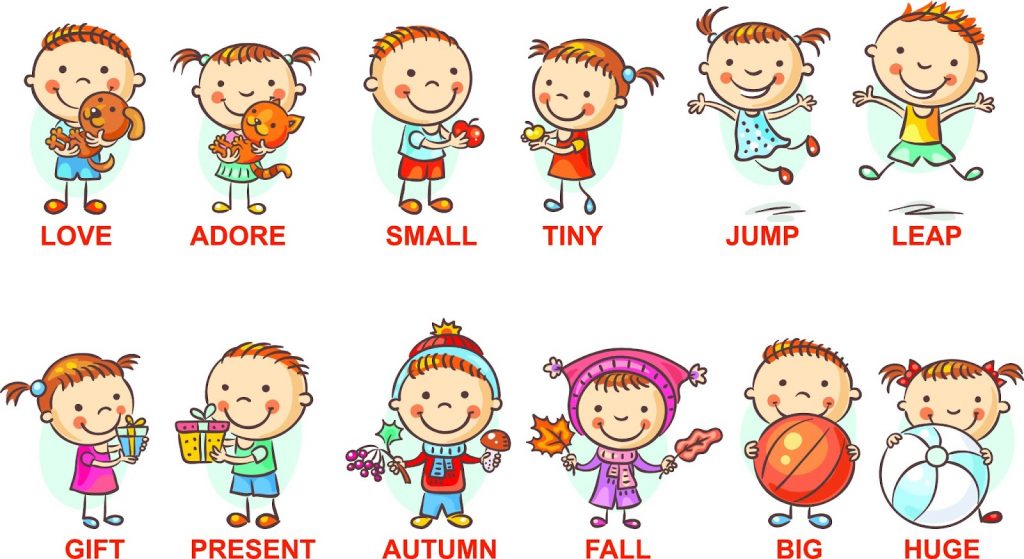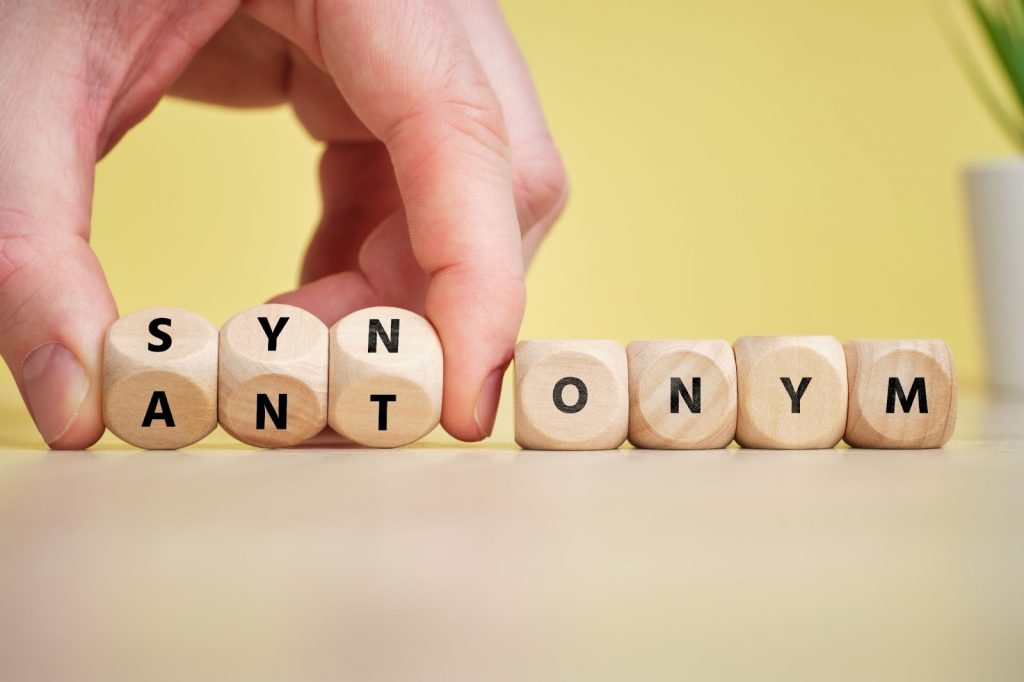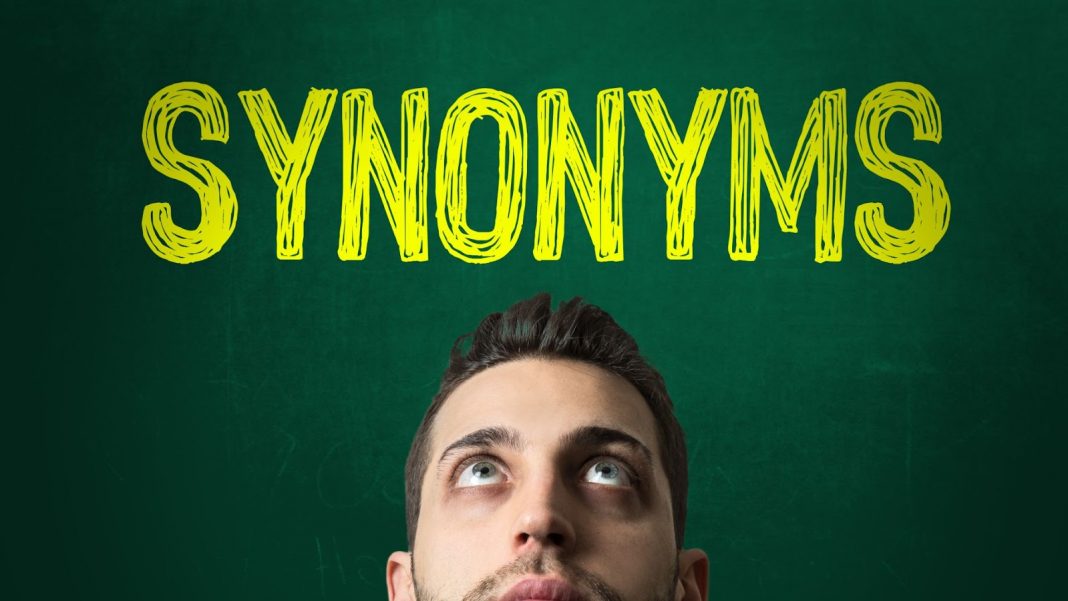Have you ever noticed how your little ones sometimes use the same words over and over again? It’s adorable, but wouldn’t it be great if they could spice up their vocabulary a bit? That’s where synonyms come in! In this article, we’ll explore the wonderful world of synonyms and how they can help your kids become word wizards.
Math & ELA | PreK To Grade 5
Kids see fun.
You see real learning outcomes.
Watch your kids fall in love with math & reading through our scientifically designed curriculum.
Parents, try for free Teachers, use for free
But first, let’s start with the synonym definition. Synonyms are words with the same meaning as another word. So, when your child learns synonyms, they’re actually discovering a whole bunch of new words that can express similar ideas. It’s like unlocking a secret code to a treasure trove of words. Let’s dive into the land of words and uncover the magic of synonyms together!
Synonyms Definition: Synonyms Meaning and Examples

Have you ever come across words that mean the same thing? Well, those are called synonyms! Synonyms are like friends for words—they have similar meanings and can be used interchangeably in sentences.
“A synonym is a word you use when you can’t spell the other one.” – Baltasar Gracián.
For example, let’s imagine you’re talking about the word “happy.” Well, there are other words that mean the same thing as “happy,” such as “glad” or “joyful.” They all describe the feeling of being happy, just like different flavors of ice cream can all taste sweet and delicious.
So, if you’re writing a story or an essay and you want to make it more interesting, you can use synonyms to avoid repeating the same word over and over again. It’s like having a bunch of colorful markers to draw with instead of just one! You might already be using synonyms without even realizing it. Remember those times when you said, “Let’s go for a walk” instead of “Let’s go for a stroll”? Well, “walk” and “stroll” are synonyms—they both mean going for a leisurely walk outside. You naturally used a synonym to make your sentence sound more lively and fun!
Let’s now explore a few synonyms examples:
- Happy: joyful, delighted, content
- Sad: melancholy, gloomy, sorrowful
- Brave: courageous, fearless, valiant
- Beautiful: gorgeous, stunning, lovely
- Smart: intelligent, clever, brilliant
- Funny: humorous, comical, amusing
- Big: enormous, gigantic, massive
- Small: tiny, petite, minuscule
- Begin: commence, initiate, start
- End: conclude, terminate, finish
Using synonyms can make our language more vibrant and exciting. It’s like having a big box of different toys to play with instead of just one. So, encourage your little ones to explore synonyms and have fun with words! Now that we’ve understood what does synonym mean, let’s delve into its counterpart, antonyms, and unravel the intriguing world of word opposites.
Synonym vs. Antonym: Understanding the Contrast between Words

Synonyms and antonyms are two important concepts when it comes to words and their meanings. Let’s take a closer look at the difference between them:
- What are Synonyms?
Synonyms are words that have similar meanings. For example, words like “happy,” “joyful,” and “glad” are synonyms because they all express a positive and cheerful feeling. Using synonyms allows us to make our language more expressive and avoid repetition. It’s like having word buddies that share the same or similar meanings.
- What are Antonyms?
On the other hand, antonyms are words that have opposite meanings. Think of words like “hot” and “cold.” They represent different temperature extremes and are considered antonyms. Antonyms help us contrast ideas and express opposing concepts. They are like word opposites that create a balance in our language.
In simple terms, synonyms are like friendly word companions with similar meanings, while antonyms are like word opposites that add contrast to our language. Both synonyms and antonyms play a crucial role in enriching our vocabulary and improving our communication skills.
Let’s take a closer look to better understand what are synonyms and antonyms:
| Synonyms | Antonyms |
|---|---|
| Synonym Definition: Words with similar meanings | Antonym Definition: Words with opposite meanings |
| Example: Hot – Scorching | Example: Hot – Cold |
| Enhance variety and richness of language | Express contrast and differentiation |
Now that we have a clearer understanding of synonyms and antonyms, let’s explore the purpose and benefits of using synonyms in our daily language.
Adding Flavor to Language: Exploring 4 Purposes of Synonyms
Now that we know what are synonyms you might be wondering why they even matter. Well, let us tell you, synonyms have some pretty cool purposes. According to Elizabeth R. Schotter, synonyms provide semantic preview benefits in English and are the pillar of communication. Here’s why they are important:
1. Adding Variety and Color to Our Language: Imagine if we used the same word over and over again. It would get boring pretty quickly, right? Synonyms come to the rescue by giving us alternative words with similar meanings. They make our language more interesting and vibrant.
2. Avoiding Repetition: Have you ever read something where the same word was repeated too many times? It can be tiresome and dull. Synonyms help us avoid this repetition by providing different words that convey the same message. They allow us to express ourselves in a more diverse and engaging way.
3. Enhancing Clarity and Precision: Sometimes, a single word might have multiple meanings or interpretations. By using synonyms, we can provide clarity and ensure that our intended message is understood. Synonyms allow us to choose the word that best fits the context and conveys our exact meaning.
4. Expanding Vocabulary: Using synonyms helps us expand our vocabulary. When we encounter new words with similar meanings, we learn more about the nuances and shades of language. It’s like discovering new flavors of words and becoming a master of expression.
Now that we know why synonyms are awesome, let’s dive into the different types of synonyms that exist.
“The richness of the human experience would vanish without synonyms.” – Thesaurus Rex
From Identical to Related: Classifying the 3 Types of Synonyms
Synonyms are like word buddies, but did you know that they come in different types? Let’s explore the various types of synonyms in a simple and fun way to deepen our understanding of synonym definition. By understanding these different categories, we can fully grasp the richness and versatility that synonyms bring to our language. So, let’s dive in and unravel the fascinating world of synonyms together!
1. Absolute Synonyms
Absolute synonyms are words with the same meaning with no distinction. These synonyms are fully interchangeable, allowing one word to replace another without altering the intended message.
Examples of absolute synonyms include:
- Identical: indistinguishable
- Drink: beverage
- Insect: bug
In these cases, substituting one word with its absolute synonym maintains the exact meaning and intent.
2. Partial Synonyms
Partial synonyms are words that exhibit minor differences in meaning while remaining broadly similar. These disparities can arise from variations in a concept’s degree, quantity, or specificity.
Partial synonyms are words that overlap in meaning but don’t fully match. They’re like puzzle pieces that fit together but not perfectly. For example, “smart” and “intelligent” are partial synonyms because they both refer to intelligence, but “intelligent” suggests a higher level of intellect.
3. Near Synonyms:
Near synonyms are words that have similar meanings but with slight differences. They’re like cousins who share common traits but also have their unique qualities. For instance, “big” and “large” are near synonyms because they both describe something of significant size, but “large” emphasizes a larger size compared to “big.”
Some other examples of near-synonyms include:
- Smart: witty
- River: creek
- Hairy: furry
Although they have distinct meanings, they are closely associated, and selecting one over the other can lend a specific connotation or evoke a particular image.
Knowing the different types of synonyms helps writers pick the right words and communicate more clearly. Absolute synonyms are great when we need words that mean exactly the same thing. Partial synonyms are useful for expressing slight differences in meaning. Near-synonyms can be used to create specific associations or connections. By using synonyms effectively, we make our writing richer and easier to understand.
Synonyms of Synonyms
Lewis Carroll, in his book Synonyms in Context, provides a synonym definition, stating that synonyms are words that have the same or similar meanings. However, he acknowledges that confusion can arise when people mistakenly associate synonyms with other word relationships such as polysemy, homonymy, and contronymy.
Let’s explore these terms in detail:
- Polysemy: Polysemy refers to a phenomenon where a single word has multiple related meanings. It’s like one word wearing different hats. For example, the word “bank” can refer to a financial institution or the edge of a river. These different meanings are all tied to the same word, showcasing the versatility and richness of language.
- Homonymy: Homonymy occurs when two or more words sound alike but have different meanings. They’re like word twins that may or may not be related. For instance, “rose” can refer to a flower or the past tense of the verb “rise.” These words are spelled and pronounced the same, but their meanings are distinct. Homonyms can lead to humorous wordplay and create confusion if not used carefully.
- Contronymy: Contronymy, also known as auto-antonymy or Janus words, refers to words that have opposite meanings. They’re like linguistic tricksters that can be interpreted in two conflicting ways. For example, the word “cleave” can mean to split apart or to adhere closely together. Contronyms can be quite puzzling, as the same word can convey opposing ideas.
Polysemy, homonymy, and contronymy add layers of intrigue and complexity to the study of word meanings. They remind us of the fascinating intricacies and ambiguities that exist within language.
Now that we’ve explored the synonyms of “synonym,” and learned about these intriguing concepts, let’s move on to discovering how we can find synonyms when we need them. Keep reading to uncover practical tips for synonym discovery!
Related Reading: Ways to Get Kids Excited About Reading
Word Hunting Made Easy: A Guide to Finding Synonyms
Finding synonyms can be like going on a treasure hunt for words. Luckily, there are simple ways to uncover those hidden gems. Let’s explore how to find synonyms in a fun and easy way:
- Utilize a Thesaurus: A thesaurus is a powerful tool that acts as your word companion. It provides a wealth of synonyms for any word you want to explore. Just look up your word of interest, and you’ll be greeted with a plethora of alternative words to choose from.
- Online Resources: The internet is a treasure trove of information, including various websites and apps dedicated to synonyms. Take advantage of these resources by typing in your word and uncovering a vast selection of synonyms at your fingertips.
- Pay Attention to Context: Context can be your guide in finding synonyms. When reading, observe how authors use words to convey similar meanings. Context clues, such as words or phrases that share the same idea, can point you in the direction of suitable synonyms to incorporate into your own writing.
- Expand Your Reading Horizons: The more you read, the more exposure you’ll have to different words and their synonyms. By delving into a diverse range of books, articles, and other written materials, you’ll naturally encounter new words and expand your synonym repertoire.
Remember, finding synonyms is not just about replacing words, but about enhancing your language skills and expressing yourself more creatively. With the help of a thesaurus, online resources, attention to context, and broad reading habits, you’ll unlock a world of synonyms waiting to be discovered.
Related Reading: Best Tips & Strategies to Teach English Language
Conclusion
Synonyms are powerful linguistic tools that bring variety, clarity, and richness to our language. They are like word buddies that offer alternative ways to express ideas and avoid repetitive language. Synonyms add color and vibrancy to our communication, making it more engaging and interesting. By using synonyms, we can enhance our writing and speaking by avoiding monotony and introducing new shades of meaning. They provide us with the flexibility to choose the best words to convey our intended message and ensure clarity and precision in our communication.
Whether we’re using a thesaurus, exploring online resources, paying attention to context, or simply reading widely, finding synonyms is an exciting journey of word discovery. It allows us to unlock a world of word options, making our language more versatile and expressive.
Remember, synonyms are not just word substitutes; they are our partners in communication, adding depth and nuance to our expressions. So, let’s wholeheartedly embrace the synonym adventure and embark on a lifelong journey of discovery, where the synonym definition becomes a gateway to unlocking the boundless potential of language.
Happy synonym hunting!
Frequently Asked Questions (FAQs)
Why should I use synonyms in my writing?
It adds variety and color to your language, making it more interesting to read. Synonyms also help you avoid repetitive language and express yourself in a more diverse and engaging way. They enhance clarity and precision by allowing you to choose the word that best fits the context.
Can using too many synonyms make my writing confusing?
While synonyms can add variety and richness to your writing, it’s important to strike a balance. Using too many synonyms within a short span can indeed confuse readers. Choose synonyms judiciously, ensuring they accurately convey your intended meaning and flow smoothly within the context.
Are synonyms interchangeable in all contexts?
While synonyms have similar meanings, they may not always be interchangeable in all contexts. The choice of synonym depends on the specific context, tone, and intended meaning. Some synonyms may have additional connotations or be more appropriate in certain situations. It’s essential to consider the nuances and shades of meaning associated with each synonym to select the most fitting word for your particular context.
























